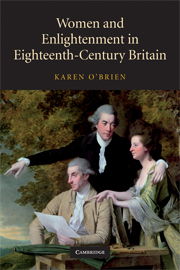Book contents
- Frontmatter
- Contents
- Acknowledgements
- Introduction: the progress of society
- 1 Anglican Whig feminism in England, 1690–1760: self-love, reason and social benevolence
- 2 From savage to Scotswoman: the history of femininity
- 3 Roman, Gothic and medieval women: the historicisation of womanhood, 1750–c.1804
- 4 Catharine Macaulay's histories of England: liberty, civilisation and the female historian
- 5 Good manners and partial civilisation in the writings of Mary Wollstonecraft
- 6 The history women and the population men, 1760–1830
- Notes
- Bibliography
- Index
4 - Catharine Macaulay's histories of England: liberty, civilisation and the female historian
Published online by Cambridge University Press: 04 September 2009
- Frontmatter
- Contents
- Acknowledgements
- Introduction: the progress of society
- 1 Anglican Whig feminism in England, 1690–1760: self-love, reason and social benevolence
- 2 From savage to Scotswoman: the history of femininity
- 3 Roman, Gothic and medieval women: the historicisation of womanhood, 1750–c.1804
- 4 Catharine Macaulay's histories of England: liberty, civilisation and the female historian
- 5 Good manners and partial civilisation in the writings of Mary Wollstonecraft
- 6 The history women and the population men, 1760–1830
- Notes
- Bibliography
- Index
Summary
John Stuart Mill, Mary Wollstonecraft and Catharine Macaulay voiced their hostility to the idea that the chivalrous treatment of women was a true ‘test of civilization’, and their doubts about the very histories of civilisation from which such notions of chivalry were drawn. In the next two chapters, I will consider how far the latter two writers felt it necessary to rewrite those histories of civilisation in order to challenge the cult of chivalric manners, and the extent to which they deployed and adapted contemporary vocabularies of progress, civil society and commerce to their own ends. In the case of Wollstonecraft, we will see an intensely revisionist engagement, on the ground of moral philosophy, with Scottish ideas of the progress of society. In the case of Macaulay, no less deeply read than her younger contemporary in the historical and sociological works of her time, there is a defiant attempt to update older ideas of male and female freedom on the ground of history. In Mill's case, beyond the scope of this book, we see a thoroughgoing scepticism as to whether history can form a basis from which to argue against the subjection of women. Mill was doubtful about the value both of history and of Christianity as resources for the case for liberty. Macaulay and Wollstonecraft, however, drew considerable inspiration from their Protestant faith when seeking to reinterpret the past and imagine the future in the image of liberty.
- Type
- Chapter
- Information
- Women and Enlightenment in Eighteenth-Century Britain , pp. 152 - 172Publisher: Cambridge University PressPrint publication year: 2009
- 1
- Cited by



